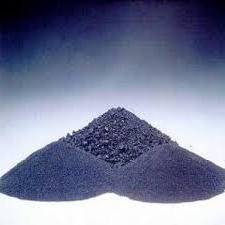Facts About Boron Carbide: Applications & Uses

Boron Carbide is a superiorly hard material (Mohs hardness > 9) and is one of the hardest materials known behind Diamond and cubic boron nitride. The material is sought after due to its high hardness, abrasive wear resistance, fracture toughness, chemical inertness, and important to the nuclear industry, a high neutron absorbing cross section. Boron Carbide powders can be used for reaction bonded, hot-pressed or sintered ceramic applications. The material is therefore well suited for technical ceramics, wear parts, and other industrial parts such as body and vehicle armor. Other uses include refractory additives and honing sticks.
Boron Carbide is produced by the reaction of Boron Trioxide and Carbon at high temperatures in an electric arc furnace. The material is then milled and purified.
US Supply offers the Boron Carbide in straight FEPA sizes as well as custom sizes.
Properties of Boron Carbide
- High Hardness
- Abrasion / Wear-Resistance
- Abrasive
- Fracture Toughness
- Chemical Inertness
- High Neutron Absorbing Cross Section
Common Uses of Boron Carbide
Abrasives
Due to its high hardness, boron carbide powder is used as an abrasive in polishing and lapping applications, and also as a loose abrasive in cutting applications such as water jet cutting. It can also be used for dressing diamond tools.
Nozzles
The extreme hardness of boron carbide gives it excellent wear and abrasion resistance and as a consequence it finds application as nozzles for slurry pumping, grit blasting and in water jet cutters
Nuclear Applications
Its ability to absorb neutrons without forming long lived radio-nuclides make the material attractive as an absorbent for neutron radiation arising in nuclear power plants. Nuclear applications of boron carbide include shielding, and control rod and shut down pellets.
Ballistic Armour
Boron carbide, in conjunction with other materials also finds use as ballistic armour (including body or personal armour) where the combination of high hardness, high elastic modulus, and low density give the material an exceptionally high specific stopping power to defeat high velocity projectiles.
Boron Carbide Physical & General Properties
- Atomic Number – 5
- Atomic Weight – [10.806, 10.821]
- Melting Point – 2,200 °C (4,000 °F)
- Boiling Point – 2,550 °C (4,620 °F)
- Specific Gravity – 2.34 (at 20 °C [68 °F])
- Oxidation State – +3
- Electron Configuration – 1s22s22p1
Application of Boron Carbide Powers
- Reaction Bonded Parts
- Hot-Pressed Parts
- Sintered Parts
- Technical Ceramics
- Body and Vehicle Armor
- Nuclear Shielding
- Wear Parts
- Abrasives
- Lapping
- Refractory
Other Common Boron Carbide Applications
Other applications include ceramic tooling dies, precision toll parts, evaporating boats for materials testing and mortars and pestles.
Typical Properties For Boron Carbide
- Density (g.cm-3) – 2.52
- Melting Point (°C) – 2445
- Hardness (Knoop 100 g) (kg.mm-2) – 2900 – 3580
- Fracture Toughness (MPa.m-½) – 2.9 – 3.7
- Young’s Modulus (GPa) – 450 – 470
- Electrical Conductivity (at 25 °C) (S) – 140
- Thermal Conductivity (at 25 °C) (W/m.K) – 30 – 42
- Thermal Expansion Co-eff. x10-6 (°C) – 5
- Thermal neutron capture cross section (barn) – 600
If you’re interested in discussing how Boron Carbide can be used for your application, please feel free to contact our technical team directly.
